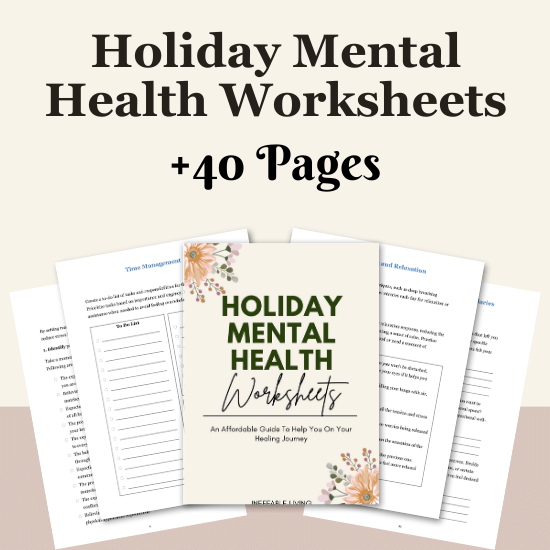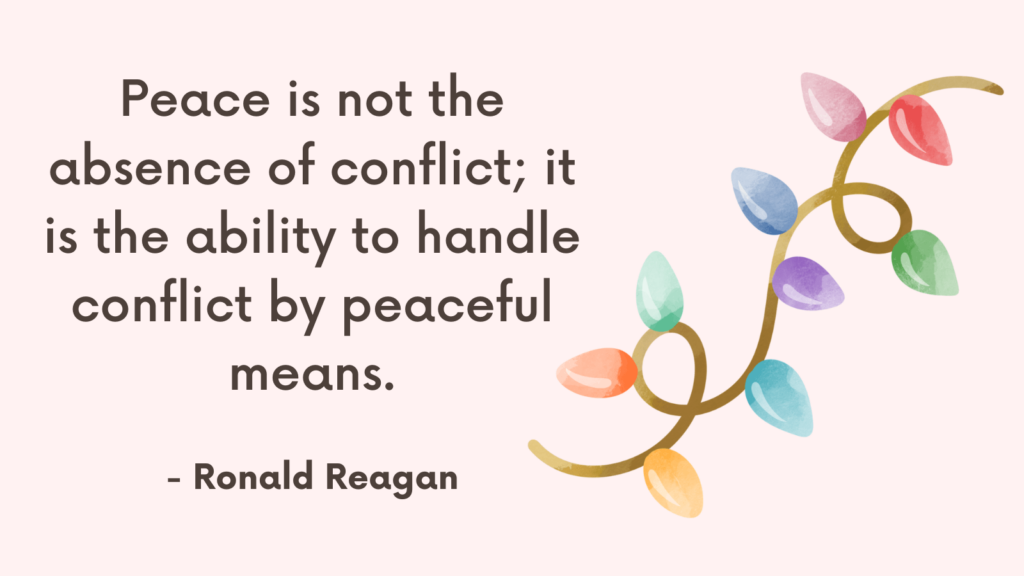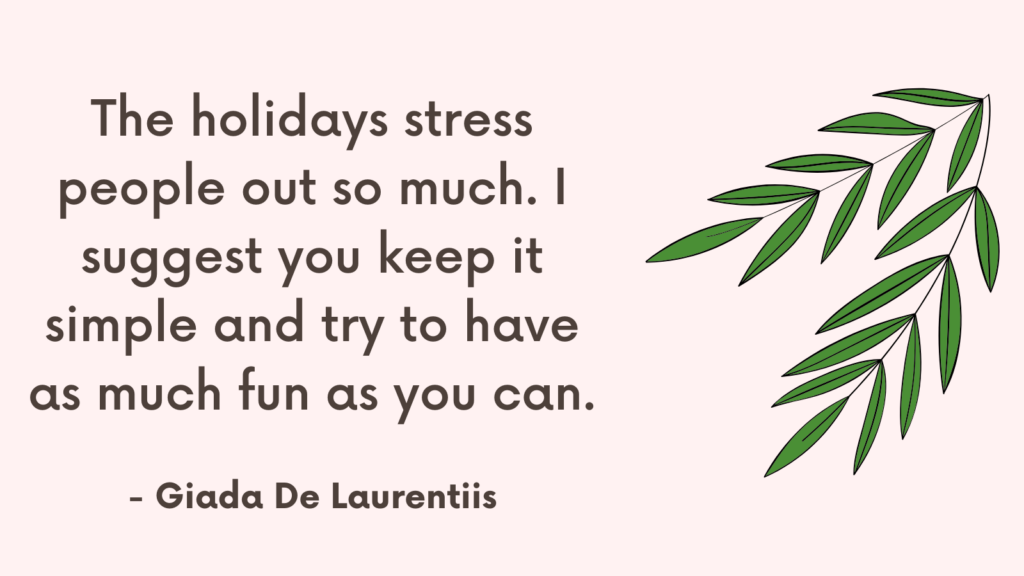The holiday season can be both joyful and stressful, especially when family gatherings bring together diverse personalities, opinions, and histories.
Here’s a guide to help you stay grounded, manage stress, and even enjoy the festivities.
Tips for Holiday Stress Management During Family Gatherings
1. Set Realistic Expectations
The pressure to make holidays “perfect” can cause unnecessary stress. Instead, focus on enjoying the moment rather than meeting unrealistic standards.
– Tip: Focus on the parts of the holiday you enjoy, whether it’s certain family members, a favorite dish, or a tradition. Avoid putting too much pressure on yourself to please everyone.
2. Practice Boundaries (and Plan Ahead)
Knowing your limits in advance can make a big difference in how you handle interactions. Set personal boundaries about topics that are off-limits or about how much time you’ll spend in certain gatherings.
– Tip: Politely excuse yourself if conversations turn stressful or personal. Practicing simple responses like, “Let’s focus on enjoying the day,” can help diffuse tension.
3. Take Breaks to Recharge
If the gathering starts to feel overwhelming, step away for a bit. A quick walk outside, a moment of quiet in a separate room, or a brief meditation can refresh your mindset.
– Exercise: Plan short breaks before or after meals or high-energy activities. A 5-minute breathing exercise or a brief walk can help you manage stress and come back with a calm mindset.
Related: How Resilience Works? Top 10 Powerful Ways to Stay Healthy and Happy During Tough Times
4. Limit Alcohol Intake
Alcohol can sometimes heighten emotions and lower inhibitions, which can complicate family dynamics. Being mindful of your consumption can help you stay centered.
– Tip: Start with a non-alcoholic drink, sip slowly, or have a glass of water between drinks. This way, you stay present and grounded during conversations.
5. Practice Gratitude and Focus on the Positive
Shifting your focus from potential stressors to positive aspects can change your perspective.
– Exercise: Begin each morning by listing three things you’re grateful for. You might focus on people you’re looking forward to seeing, a favorite food, or a cozy atmosphere.
Related: +400 A To Z Gratitude List
6. Manage Conversations with Empathy
Holiday gatherings can sometimes bring up challenging conversations. Approach these moments with empathy, understanding that everyone is bringing their own stress and expectations.
– Tip: If a topic feels charged, try redirecting the conversation toward lighter subjects. You can say, “Let’s catch up on what’s new with you!” or “What’s been the highlight of your year?”
7. Schedule “Me Time” Before and After
Balance social gatherings with personal time to recharge. Plan for some quiet moments before the holiday or afterward, giving yourself a buffer.
– Tip: Take a few hours after gatherings for self-care—watch a favorite movie, read, or engage in a hobby that relaxes you.
Related: 35 Self Care Saturday Ideas To Try This Weekend
8. Prepare a Support System
Sometimes, having a friend or family member you can check in with provides great support.
– Tip: Arrange to text or call a friend briefly if you need a breather. Knowing you can touch base with someone who understands can offer reassurance.
9. Practice Deep Breathing
When conversations or gatherings feel intense, a few deep breaths can help center you.
– Exercise: Try the 4-7-8 technique: Inhale for 4 counts, hold for 7, and exhale for8. This simple exercise calms your nervous system and helps you refocus.
10. Keep Perspective and Humor
The holiday season only lasts a short while, and keeping things in perspective can help ease tension. Remember, laughter can be a powerful stress reliever!
– Tip: Embrace humor where possible. Sharing a lighthearted story or appreciating funny moments can keep the atmosphere positive.
Related: Top 10 Exercises to Cultivate an Attitude of Gratitude

Common Triggers During Family Events (and Why They Matter)
Family events — especially during holidays, celebrations, or reunions — can bring people together in joyful ways. But they can also bring emotional discomfort, old tensions, and unresolved wounds to the surface. If you find yourself feeling anxious, angry, drained, or withdrawn during these gatherings, you’re not alone. Understanding common emotional triggers and why they matter can help you navigate family events with more awareness, compassion, and boundaries.
1. Old Roles Resurfacing
You may find yourself falling back into outdated roles — the peacemaker, the problem child, the overachiever — even if you’ve grown beyond them. Family systems often reinforce these identities unconsciously, making you feel stuck or misunderstood.
Why it matters: These roles can invalidate your current self and make you feel emotionally trapped, causing stress, resentment, or disconnection.
2. Lack of Boundaries
Many family environments blur or ignore personal boundaries. You might be asked intrusive questions, forced into uncomfortable conversations, or expected to behave a certain way.
Why it matters: A lack of boundaries can make you feel emotionally unsafe, leading to irritability, shutdown, or a need to escape.
3. Unresolved Conflict
Past arguments, betrayals, or long-standing family tensions often lie just beneath the surface at gatherings. Even if no one brings them up directly, the emotional weight is still present.
Why it matters: Suppressed conflict can trigger anxiety, hypervigilance, or emotional exhaustion — especially if you feel pressure to keep the peace.
4. Comparison and Criticism
Family events sometimes bring out comparisons — about careers, parenting styles, appearances, or accomplishments. You may feel judged, measured, or not enough.
Why it matters: Criticism and comparison tap into core self-esteem wounds and can trigger shame, inadequacy, or the urge to withdraw.
5. Grief and Absence
Holidays and milestones often highlight who is missing — whether through death, estrangement, or distance. Even happy moments can be shadowed by longing or sadness.
Why it matters: Grief may resurface more strongly in the presence of family, creating an emotional undercurrent that’s hard to express openly.
Related: 10 Tips on Coping with Grief During the Holiday Season
6. Differing Beliefs or Values
Generational, political, or religious differences can spark tension at the dinner table. Even subtle comments or passive-aggressive remarks can feel deeply triggering if they invalidate your identity or beliefs.
Why it matters: Feeling unseen or disrespected by family — especially when trying to stay connected — can lead to anger, sadness, or deep frustration.
7. Feeling Like an Outsider
Not everyone feels like they truly belong in their family system. You may feel different because of your personality, lifestyle, or life choices. Being surrounded by people who don’t understand you can feel isolating.
Why it matters: Feeling emotionally excluded or misunderstood activates deep relational wounds, leading to withdrawal or self-doubt.
8. Perfectionism and Performance Pressure
You may feel pressure to host flawlessly, appear happy, or keep everyone else comfortable. This emotional labor is often invisible — but heavy.
Why it matters: The pressure to perform can lead to resentment, burnout, and emotional disconnection from the event itself.
Related: Managing Post-Holiday Fatigue: How to Recharge Mentally and Emotionally?
Conclusion
Family gatherings may come with stress, but with these strategies, you can prioritize your well-being, handle challenging moments, and savor the holiday season.
It’s all about balance—finding ways to enjoy the season while taking care of yourself along the way.



